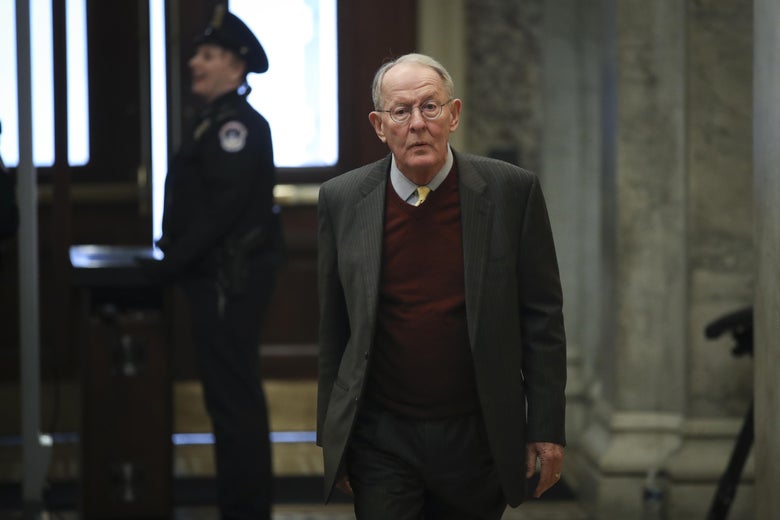
Sen. Lamar Alexander came down firmly on the side of “he did it, but so what.”
Drew Angerer/Getty Images
Late on Thursday night, Republican Sen. Lamar Alexander issued a statement marking the likely end to Democratic efforts to bring in new witnesses and documents as evidence in the impeachment trial of President Donald Trump—and with that, the likely end of the trial. Alexander was part of the small handful of Republicans discussed as potential swing votes in favor of calling witnesses, because he is retiring after his term ends and because he has cultivated a reputation as a staunch institutionalist.
Sen. Susan Collins of Maine had announced her support for calling witnesses, giving the Democrats 48 of the 51 votes they needed. Mitt Romney appeared willing to be No. 49, and Sen. Lisa Murkowski said she was taking more time to consider whether or not to join them. But Alexander’s decision appeared to give Majority Leader Mitch McConnell a solid 50 votes against extending the proceedings.
Alexander conceded that Trump had done what the House’s first article of impeachment accused him of doing, abusing his power as president to try to extort Ukraine into harming his political rivals, and that that was “inappropriate.” However, he wrote, it was not enough of a reason for the Senate to remove Trump from office—and since the underlying question of Trump’s actions wasn’t in doubt, there was no reason to pry loose any more evidence to prove he did it.
“I worked with other senators to make sure that we have the right to ask for more documents and witnesses, but there is no need for more evidence to prove something that has already been proven and that does not meet the United States Constitution’s high bar for an impeachable offense,” Alexander wrote. “There is no need for more evidence to prove that the president asked Ukraine to investigate Joe Biden and his son, Hunter; he said this on television on October 3, 2019, and during his July 25, 2019, telephone call with the president of Ukraine. There is no need for more evidence to conclude that the president withheld United States aid, at least in part, to pressure Ukraine to investigate the Bidens; the House managers have proved this with what they call a ‘mountain of overwhelming evidence.’”
It was, effectively, an endorsement of the so-what-if-he-did-it defense put forward by Trump’s attorney Alan Dershowitz on Wednesday. Although Trump tried to extract something of value from Ukraine by misusing his powers of office, the House did not deliver the charge to the Senate under the title of “bribery,” which allowed Alexander to dismiss it as not rising to the level of “treason, bribery, or other high crimes and misdemeanors” specified in the constitution.
The second article of impeachment—charging Trump with obstruction of Congress for his blanket attempts to bar executive-branch witnesses and his refusal to comply with any subpoenas—Alexander dismissed as a “frivolous” attempt to deny the president the exercise of “his constitutional prerogative to protect confidential conversations with his close advisers.”
And so, having found one of the impeachment charges supported by the evidence, the institutionalist senator punted his oversight duties to the general public. “The question then is not whether the president did it, but whether the United States Senate or the American people should decide what to do about what he did,” he wrote. “I believe that the Constitution provides that the people should make that decision in the presidential election that begins in Iowa on Monday.”
“Let the people decide,” he concluded. He did not address the House impeachment managers’ argument that Trump’s effort to attack Joe Biden was an act of interference in that very decision, let alone the question of whether an acquitted President Trump would continue trying to undermine the election. The important thing was that it sounded principled.
And it left the two undeclared senators—or one and a half, with Romney having declared himself “very likely” to support witnesses—on the brink of a possible procedural crisis. When McConnell opened the trial by delaying the witness vote until six days of opening statements and two days of questioning could be completed, Republicans went along with it on the grounds it was a neutral scheduling decision. They weren’t voting against witnesses then, they were simply voting to make any decisions about witnesses later on.
Later on has arrived, though, and with Alexander’s commitment, 50 Republicans have hardened against even reopening the question of having witnesses. If Murkowski were to cast the 50th vote along with the Democrats, she would be creating a 50-50 tie—which would force Chief Justice John Roberts, in his position as presiding officer, to make the uncomfortable decision about whether he has the power and duty to break ties in the trial, and if so, which side to choose.
Murkowski’s contributions to the question period suggested her goal was, above all, to get along with as many people as possible. She signed onto one question asking what reason the Senate could have not to call former national security advisor John Bolton, as an additional witness “with direct knowledge” of whether or not the president sought quid pro quo with Ukraine; later, she signed onto another suggesting that Bolton’s testimony “would add nothing to the case.” Alexander’s statement, though, left no way for her to prolong the trial in the name of staying indecisive. To hear any more evidence, she would have to be willing to fight for it.
Readers like you make our work possible. Help us continue to provide the reporting, commentary and criticism you won’t find anywhere else.
Join Slate Plusfrom Slate Magazine https://ift.tt/2RLEeSZ
via IFTTT
沒有留言:
張貼留言